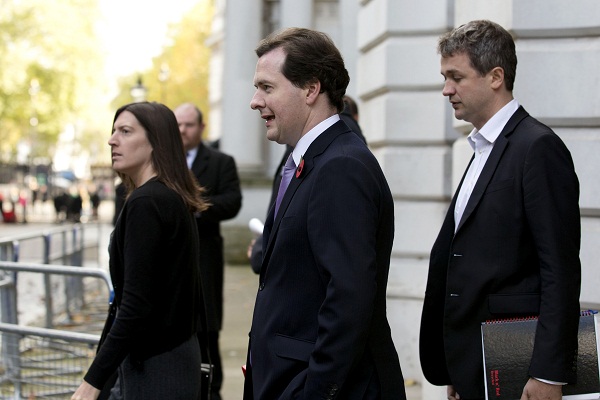George Osborne has a dilemma to answer in his autumn statement (which must be finalised by 28 November, when it will be submitted to the Office of Budget Responsibility). He has promised to offset politically welfare cuts worth £10bn with tax increases on the wealthy. There is an added complication in that Osborne cannot afford (literally) to choke recovery by imposing levies on sources of wealth creation. This leads him, logically, to pensions and property. The FT reports that the chancellor is considering reducing the maximum level of tax relief on annual pension contributions from £50,000 to either £40,000 or £30,000. It is estimated that these changes would net the Treasury an extra £600 million or £1.8bn a year respectively.
It is fashionable to see this as a political trade-off with the Lib Dems. There is doubtless a fair portion of truth in that analysis; yet Osborne knows that the Tories have a perception problem. They are seen, rightly or wrongly, as the party of the rich; a perception reinforced by the recent cut in the top rate of income tax.
Osborne, therefore, is looking after Number One. Indeed, if the priority was to seduce the Lib Dems, Osborne might have adopted their policies on property taxes (the mansion tax and new council tax bands, for instance). But these were rejected outright by the Tory High Command, partially on grounds that they would constitute a clear assault on some very ordinary folk who live in the south-east; in other words, the party’s people. The Tory leadership may aggravate its base by striking controversial poses on social issues; but it won’t take the risk on serious issues like trashing people’s homes and life’s work. The Tories might emphasise that they are on the side of the aspirational classes more often than they do.
Will Osborne’s alleged plan prove sufficient politically? The first Osborne budget cut tax relief on pensions from £255,000 to £50,000. This enormous drop did not stop the Tories being susceptible to the charge of being ‘the party of the rich’. On the basis of this record and the strategic mistakes made in the 2012 budget, I doubt that the proposed change, should it be realised, will alter the perception unless the Tories convince the public that their policy will make pensions fairer. Selective quotation of a Centre for Policy Studies briefing note suggests how this might be done. The CPS notes:
‘Before savaging tax relief, its purpose should be considered. Many would accept that it should be, ultimately, to reduce pensioner poverty, by encouraging more long-term saving. But the current distribution of tax relief is heavily skewed towards the well-off: the 8% of taxpayers who earn more than £50,000 a year receive almost 50% of all pension tax relief. Clearly, reducing pensioner poverty is not the result. Indeed, one could conclude that tax relief serves as a reverse form of wealth redistribution (the conventional approach being to favour the poor). Arguably, the wealthy do not need such an incentive to save.’
It may be that Osborne would need to introduce a further tax cut for the poor to make this argument stick (or, indeed, he might follow the CPS’ advice and restore the 10p rebate on pension dividends, abolished by Gordon Brown in 1997, and therefore re-incentivise long-term saving and investment). But the increased income tax threshold might easily serve this purpose if Osborne, and perhaps more importantly the Treasury, is reluctant to make substantial changes to the tax system.






Comments